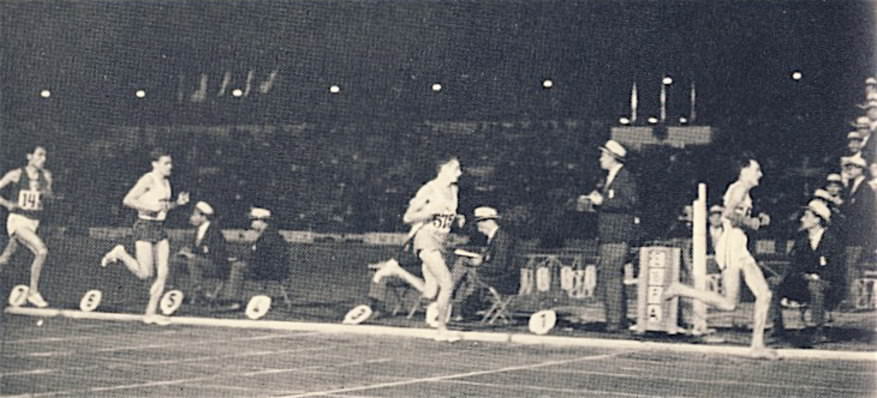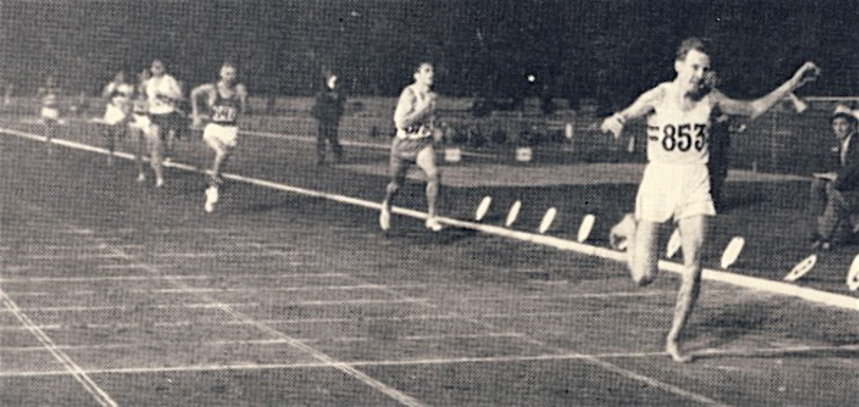Bolotnikov v Tulloh v Zimny
5,000 European Championships 1962
Great Races #15
Following his convincing 10,000 win, Russian Pyotr Bolotnikov (See Profile) looked a good bet for this race too. But his heat for this final was held only 24 hours after his 10,000 final. Further, he was forced to run a fast 13:53.4 to qualify (10th fastest time in the 1962 world rankings), so the recovery powers of this 32-year-old Russian were sure to be tested. The two other heats were won in the slow times of 14:14 and 14:15. Janke, who had run so well in the 10,000 was still tired and could manage only 8th in his heat. Prominent among the qualifiers were Zimny and Boguszewicz of Poland and Frenchmen Bogey and Bernard. Englishman Tulloh thought he had a chance. He had run a four-minute Mile and an 8:33.4 Two Miles in January, which meant he had the best basic speed in the field, but he had recently been beaten by Zimny.
 |
| Tulloh leads at the bell from Zimny, Boguszewicz and Bernard.. |
Surprisingly, Bolotnikov forced the early pace, perhaps trying to shake off the fatigue he was certainly feeling or perhaps he wanted to see if he had recovered from his great 10,000 race. He took the field through in 62.8 and 2:48 (14:00 pace). And he kept the same pace though 2K (2:49.5 for 5:37.5). The Russian still led through 3K (8:37.5), but his pace slowed noticeably. This third K in 3:00.5 was too slow for Jurek of Czechoslovakia, who took charge in the ninth lap with successive 200s of 31.6 and 31.0 to lead through 4K in 11:26.4 (2:48.9). Jurek’s injection of pace was too much for Bolotnikov, who dropped back. The lead pack caught and passed Jurek in the next 200. With 800 to go (12:00), Bernard of France was in the lead, followed by Tulloh, Boguszewicz, Zimny and Bogey. No one was willing to take charge of the race, or as Tulloh put it, “nobody…seemed to have much idea of what to do.” (Tulloh on Running, p.111)
The big move came on the back straight when barefoot Bruce Tulloh took off with just 700 to go. Only Bernard and Zimny were able to make any reasonable attempt to stay with him. It was a decisive break. At the bell (13:03.2) Tulloh had a 5-meter lead. For the rest of the race it was a question of whether Zimny could catch the barefoot Englishman. But Tulloh, running the last 400 in 57.4, had a lot left. The Pathé News film shows him leading by almost 15 meters coming into the straight. Keeping his scuttling running form well, Tulloh was able to hang on and hit the tape with 10 meters to spare over Zimny. In third was Bolotnikov, who had managed to work his way back through the field on the last lap.
 |
| Barefoot Tulloh finishes well ahead at the tape. |
“It was very tactical,” Tulloh recalled years later. “If the Russian had led all the way, I’d have let him and kicked away at the end. But we were all bundled up, so I decided to kick with 700m to go.” (BBC Sport Archives, Aug. 2, 2002) In fact, Tulloh went into the race with three plans, intending to use the one that best suited the unfolding of the race. He was prepared to hang on to Bolotnikov if the Russian made an early effort to break the field. He was also ready for a mid-race break, which actually happened though it was not decisive. And his third plan was the one he used as no one had broken away with two laps to go. (See Tony Ward, Modern Distance Running, pp. 78-80) This third tactic was similar to Halberg’s in the Rome 5,000 two years earlier, although Halberg went more than a lap earlier. And like Halberg, the exhausted Tulloh collapsed on the grass after the race. Going so early is a hard way to win. This race has become one of the classic 5,000s in track history.
1. Bruce Tulloh GBR 14:00.6; 2. Kazimierz Zimny POL 14:01.8; 3. Pytor Bolotnikov USSR 14:02.6; 4. Lech Boguszewicz POL 14:03.4; 5. Michel Bernard FRA 14:03.8; 6. John Anderson GBR 14:04.2. 
Leave a Comment